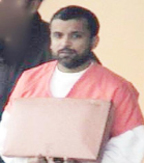Authorities do not have to await disclosures by the US about Roger Khan to investigate his criminal activities in Guyana, including his links to government, the main opposition said yesterday.
PNCR-1G MP Debra Backer told reporters yesterday that available evidence points to the Bharrat Jagdeo administration protecting or facilitating Khan’s activities, with the most recent connection being the alleged aid provided to him by Health Minister Dr Leslie Ramsammy.

Khan’s former lawyer Robert Simels claims a ‘spy’ computer was purchased through the Guyana Government and that Ramsammy was responsible for the collection of the equipment and organising the training of Khan, in the use of the computer.
Ramsammy has denied the claims.
On Thursday Cabinet Secretary Dr Roger Luncheon said a comprehensive response to the alleged links depends on the comprehensive disclosure of all that information that is now being made available piecemeal fashion. “The facts are incontrovertible,” Backer, however, said at the party’s weekly news briefing yesterday, noting that evidence emerging from court hearings, the information provided by American Government sources, and the revelations by Khan’s lawyers point to the supportive involvement of the administration. She said the party expects that there are already “fulsome” files in the possession of the police force, which must have been augmented by evidence from Suriname, where Khan was held, and court documents from the US, where he entered a guilty plea for cocaine smuggling. “If that is not so, the Commissioner of Police [Henry Greene] must inform the nation why Roger Khan’s notorious criminal enterprise in Guyana has not yet been investigated and when such an investigation would be launched,” she said, adding that collective pressure has to be sustained to push for a probe in the context of good governance and transparency.
Asked why anyone would come forward to give evidence in any investigation, especially in the absence of any witness protection scheme, Backer admitted it is a difficulty. Meanwhile, PNCR MP Lance Carberry acknowledged that during the inquiry into the activities of former Home Affairs Minister Ronald Gajraj persons were afraid to give evidence. He said while the opposition had made a number of suggestions at the time, the government was resistant. He added that in any decent government the minister would have already tendered his resignation.
According to Backer the “long association” between Khan and the administration was evident as early as 2002, when along with Haroon Yahya and Sean Belfield he was arrested at Good Hope, with weapons and a spy computer. They were intercepted by the Military Central Intelligence Division (MCID) of the GDF in a bulletproof vehicle in which was discovered an arsenal of weaponry (including military type assault weapons, some fitted with night vision telescopic sights), Uzi sub-machine guns, assorted ammunition, silencers, and also bulletproof vests and a lap-top computer cum scanner capable of intercepting both land and cellular telephone calls, Backer noted.
It still remains a mystery, she said, how Khan could have acquired this array of weapons and equipment without the help of the Government, particularly the ‘spy’ computer. MCID was not only pressured to return it to Khan but was disbanded for its pains, she added, while the case against Khan and the two others was subsequently dismissed by the late Magistrate Jerrick Stephaney.
“Thereafter, Khan formed his … “phantom gang” and they went on the rampage (going after) so-called criminals,” Backer said, citing self confessed informer George Bacchus’ claim that former Minister Gajraj was linked to Khan’s activities.
Additionally, she noted that it was while he was being hunted by former Police Commissioner Winston Felix, who was determined to bring him to justice that Khan claimed, in full page newspaper advertisements in 2006 that he was working with the administration and the security forces to “curb crime.” While Khan was later held after he was found in Suriname and later extradited to the US, Backer noted that the administration was clearly seeking to protect him by forcing Commissioner Felix from office.
The US government has said Khan was leader of a Georgetown-based cocaine trafficking organisation, which was backed by a “paramilitary squad that would murder, threaten, and intimidate” others at his directive. The organisation imported large quantities of cocaine into Guyana, which was then shipped to the Eastern District of New York and other places for distribution. The US government said Khan’s enforcers committed violent acts and murders on Khan’s orders that were directly in furtherance of his drug trafficking conspiracy. The paramilitary squad was referred to as the “Phantom Squad,” which a confidential US source said was responsible for “at least 200 extra-judicial killings” in Guyana between 2002 and 2006.





